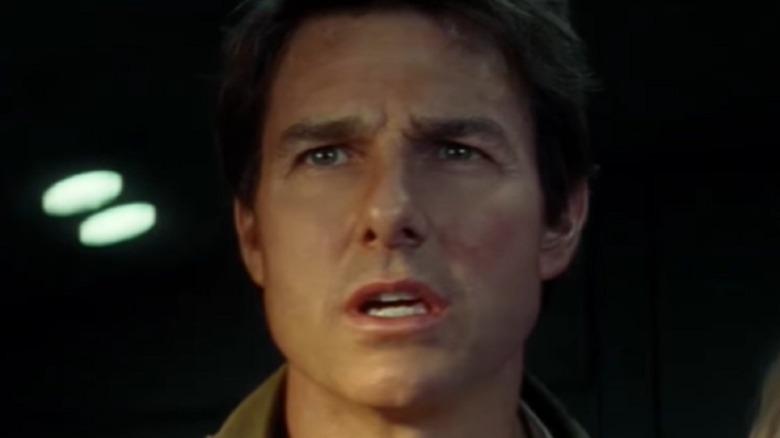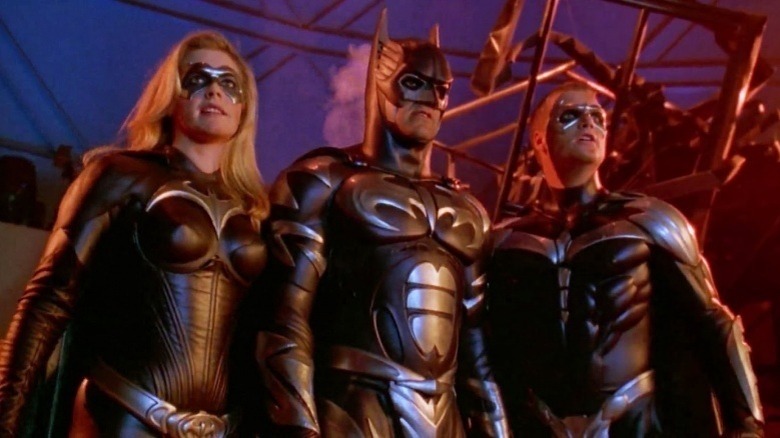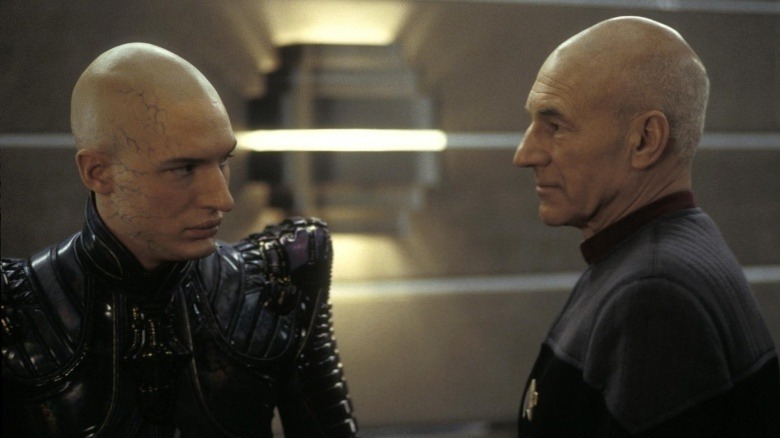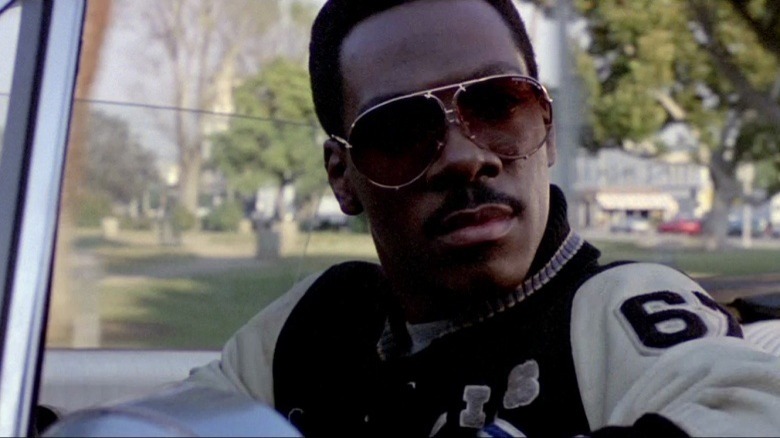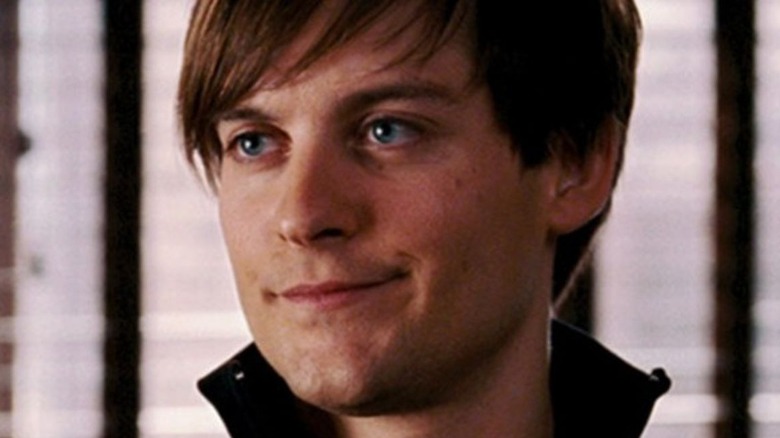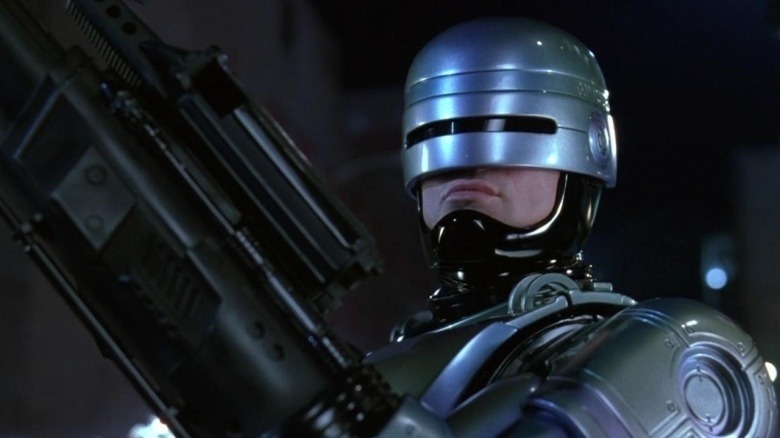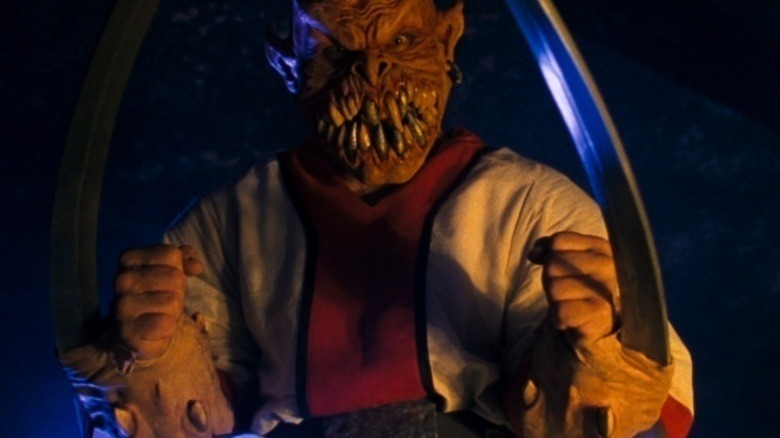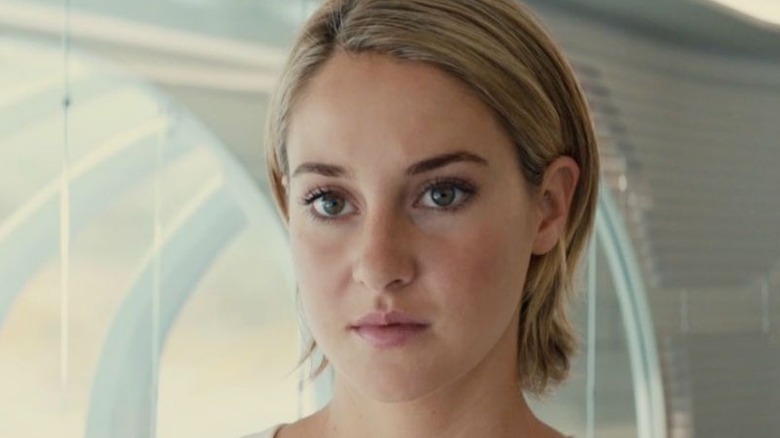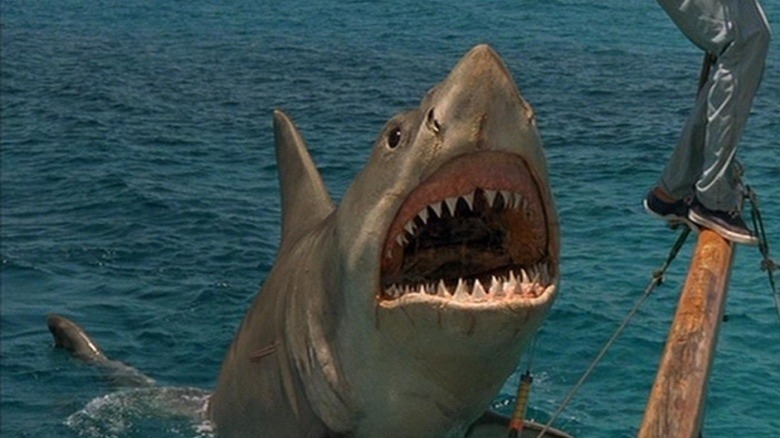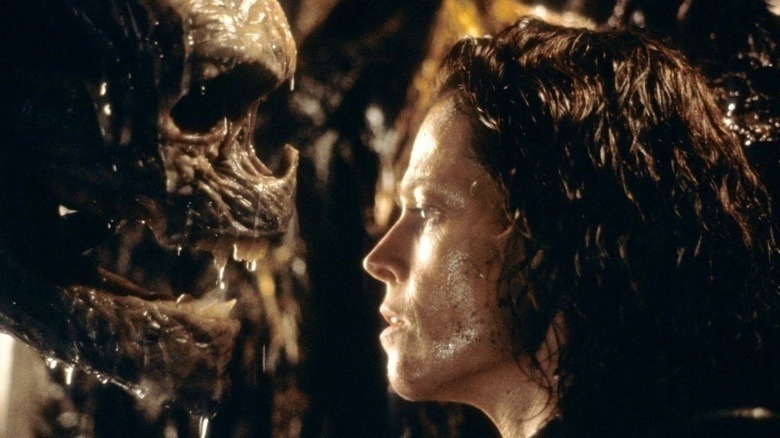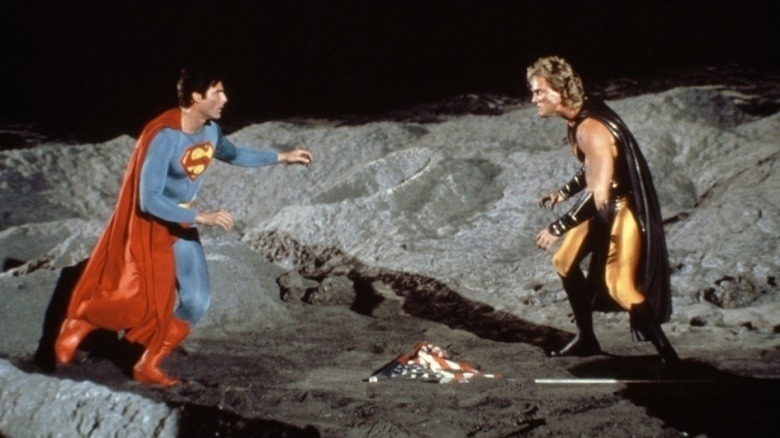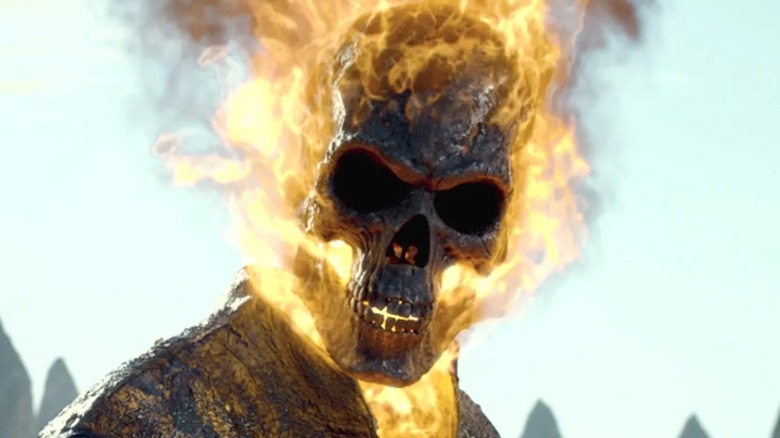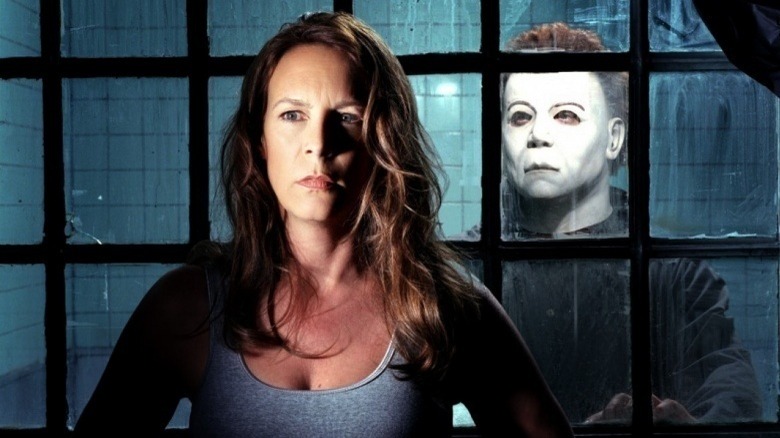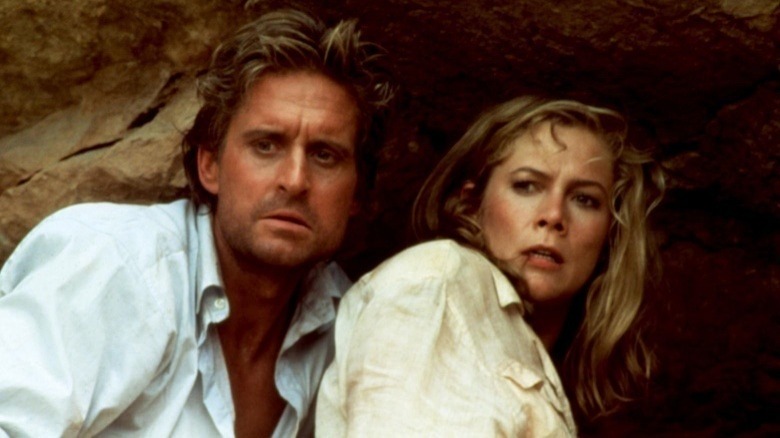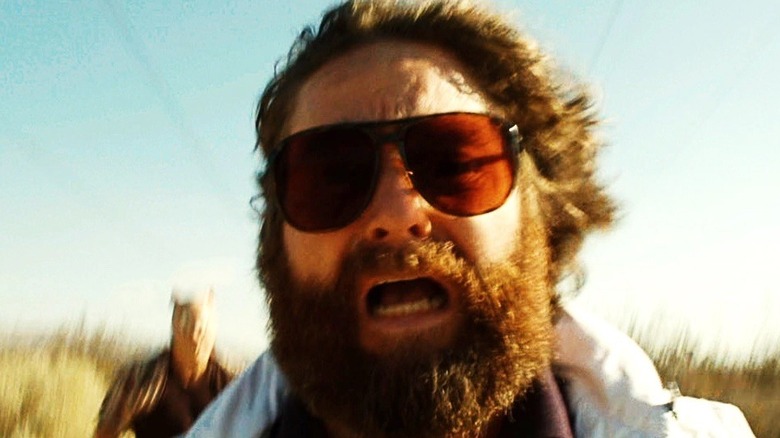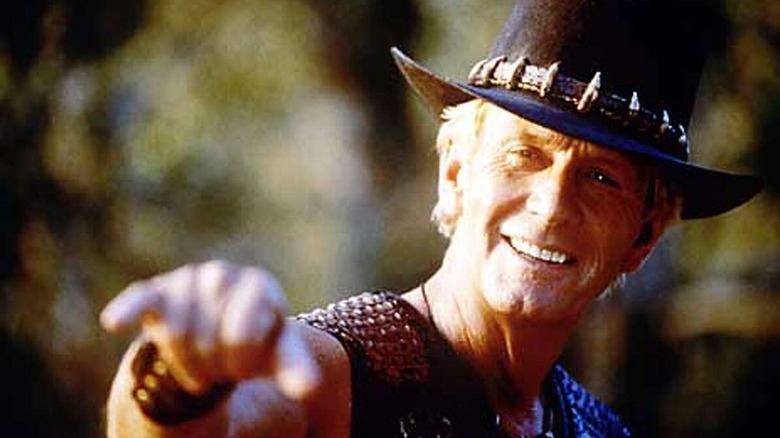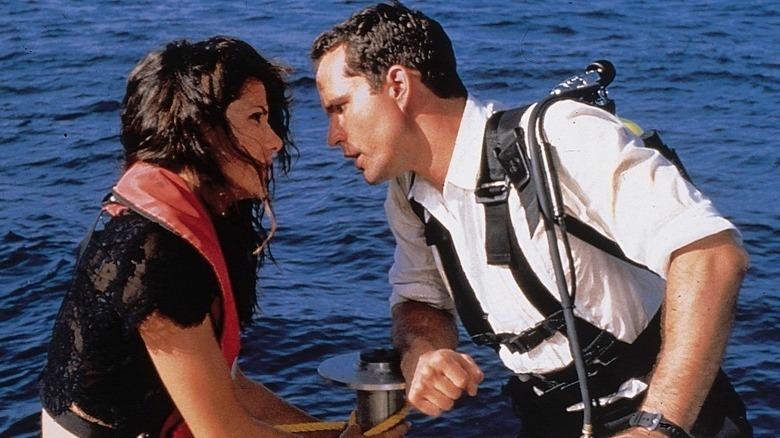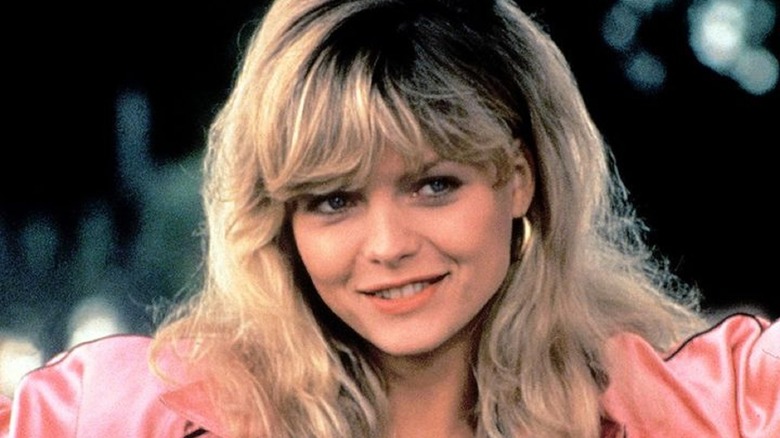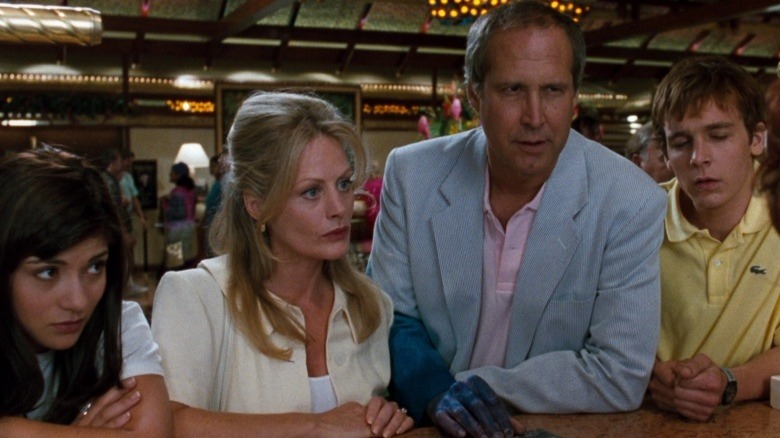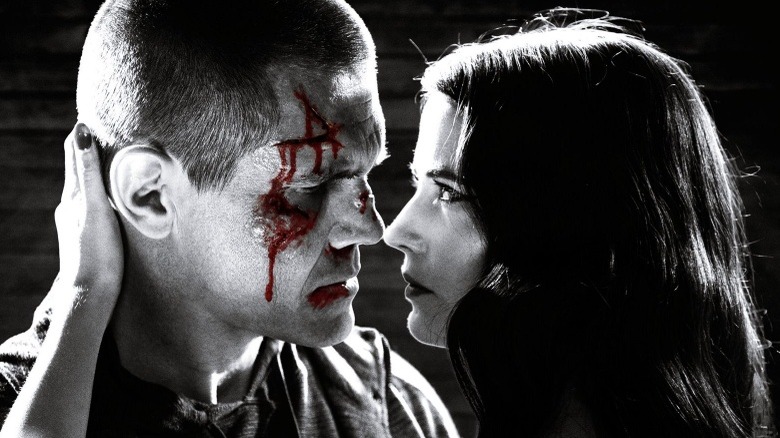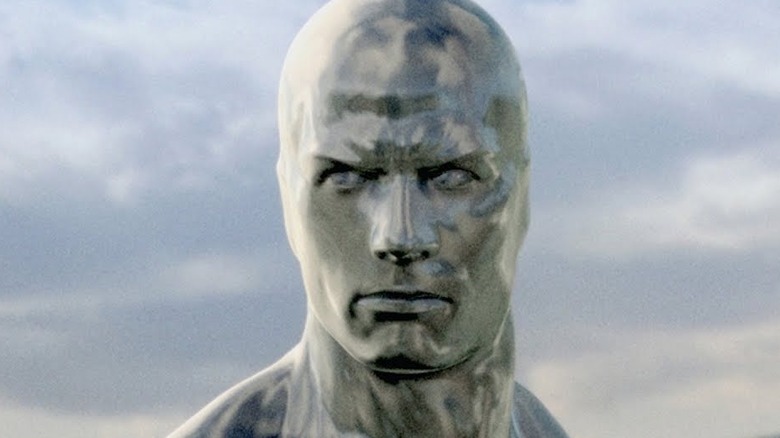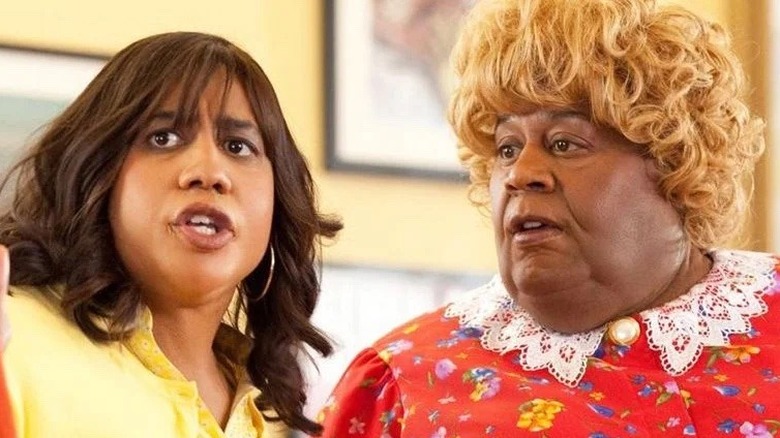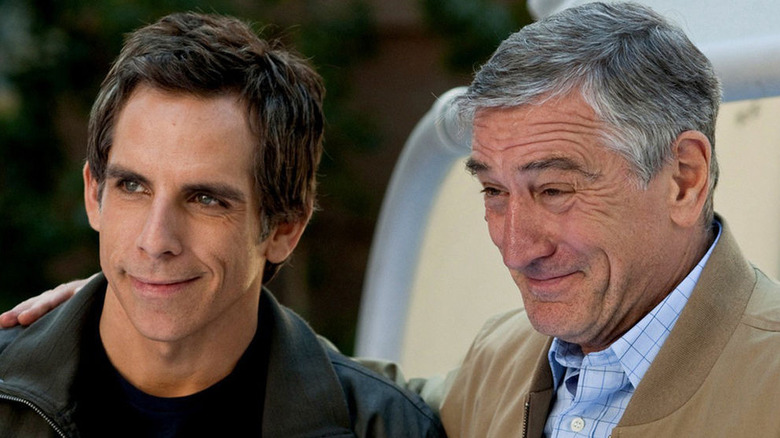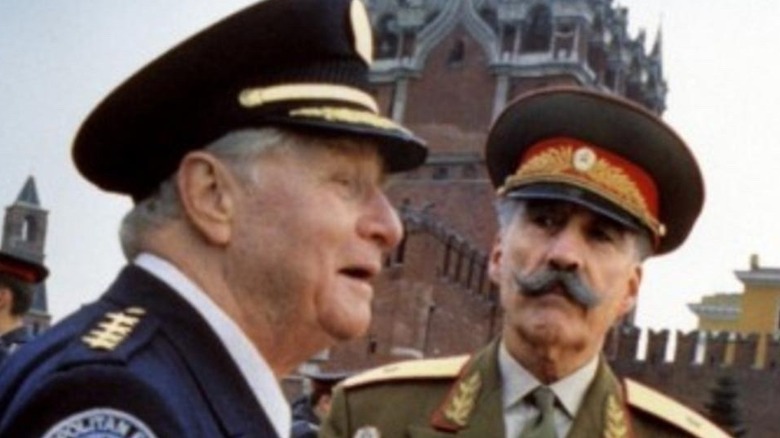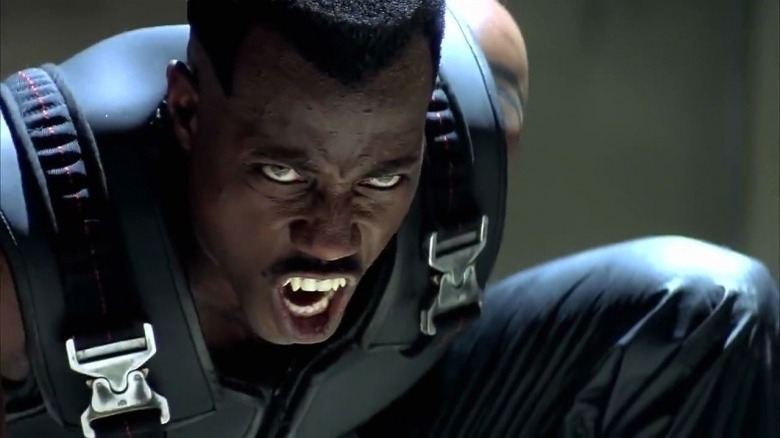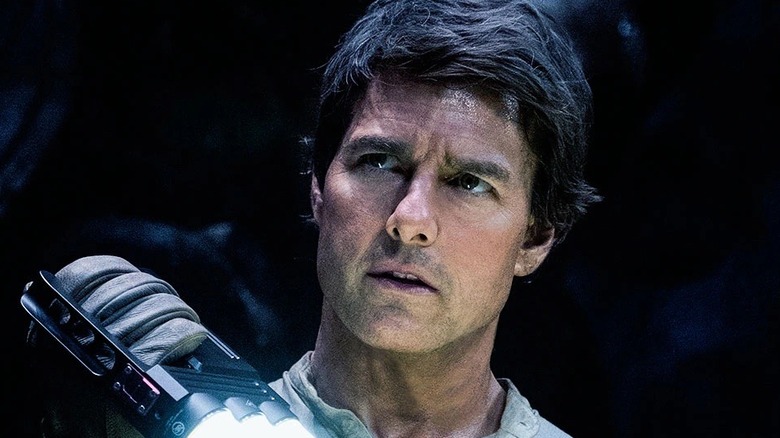Movie Sequels So Bad They Ended A Franchise
It's natural: We see a movie, we love it, it ends, and we want more. An almost unspoken contract is launched as the box-office pours in — hey movie studios, you bring everyone back and spend a few years making another one of these, and we'll be there on opening weekend.
But while movie studios love nothing more than a franchise, Hollywood has its limits when it comes to putting good money after bad. Even the widest IP brand recognition isn't enough to keep sequels coming when once-beloved franchises seem headed in the wrong direction financially. Even if a film makes $300 million, that isn't necessarily enough if the film before it made $350 million.
With that in mind, here are some particularly infamous examples of franchises that once had big deams — and the underperforming movies that sent them back to the drawing board ... or killed them off completely. From Batman to Superman, "Speed" to "Alien," some of these franchises eventually corrected course and were able to reboot, but that doesn't mean a dud didn't kill off at least one incarnation.
Batman and Robin (1997)
The Batman franchise kept right on rolling, through three leading men over the space of four films in the '80s and '90s. But it came to a screeching halt with 1997's "Batman & Robin," which found George Clooney taking over the starring role.
Director Joel Schumacher's campy tone — which started with "Batman Forever" as a deliberate attempt to honor the '60s Adam West "Batman" TV series and was ratcheted up even further with "Batman & Robin" — felt like a step back after the somewhat more serious Tim Burton installments in the franchise. The studio began developing a sequel even before "Batman & Robin" arrived in theaters, but wretched reviews and disappointing box-office grosses brought those plans to a screeching halt.
As hard as it might be to imagine today, at the time many industry watchers were predicting Batman's death as a viable silver screen character. It would take nearly a decade, and director Christopher Nolan's far grittier reinvention, to bring a rebooted Caped Crusader back to the screen. The Ben Affleck and Robert Pattinson Dark Knights couldn't be any more different than Schumacher's vision, and that certainly doesn't seem like a bad lesson learned.
Star Trek: Nemesis (2002)
The "Star Trek" franchise had a pretty remarkable run at the box office, firing off 10 films in 23 years while simultaneously ruling the syndicated airwaves with a small army of TV shows.
By the early aughts, however, the franchise had arrived at an uncomfortable crossroads. The low-rated "Star Trek: Enterprise" was its sole show remaining on the air, and grosses for the films had been solid but unimpressive over the three sequels since the cast of "Star Trek: The Next Generation" took over for the original crew. It all added up to a reduced budget and an action-heavy approach for 2002's "Star Trek: Nemesis," which was not a good fit for the thinking-person's sci-fi the series had always aspired to present.
Opening in a year-end blockbuster rush that also included films from the "Harry Potter," "Lord of the Rings," and "James Bond" franchises, "Nemesis" simply couldn't hold its own. The film was all but ignored at the box office — probably a good thing, considering its disastrous reviews. This installment's crash landing was enough to keep "Trek" films out of theaters for some time, until J.J. Abrams rebooted the franchise in 2009.
Beverly Hills Cop III (1994)
The original "Beverly Hills Cop" was one of the wildest, funniest films of the '80s, capturing one of the greatest entertainers of his generation at a time when he felt fresh, young and hungry. But the law of diminishing returns weighed heavy on its sequels.
Having struck comedy gold with Eddie Murphy as a fish-out-of-water Detroit cop in sunny L.A., the studio doubled down on action set pieces at the expense of the sharp humor that gave "Cop" its true kick. The swollen price tag that went along with Murphy's increased celebrity didn't help.
With 1994's "Beverly Hills Cop III," the franchise completely lost its way, putting Murphy's Detective Axel Foley in the midst of a convoluted, downright dull amusement park mystery that all the tailpipe bananas in the world couldn't fix. There have been numerous rumors over the years pertaining to a potential fourth film, but for now Axel seems confined to desk duty.
Spider-Man 3
Sam Raimi's "Spider-Man" movies weren't just a commercial juggernaut in the early 2000s, they were a pop culture phenomenon. Long after Superman and Batman films had become solid multiplex attractions, the initial 2002 flick starring Tobey Maguire as Peter Parker earned a staggering $821 million at the box office and a 90 percent critical approval rating on Rotten Tomatoes. "Spider-Man 2" was every bit as well received (perhaps even better) upon arrival in 2004, raking in $788 million and a 93 percent critical score.
That was the lofty neighborhood awaiting 2007's "Spider-Man 3," which earned criticism for having too many subplots, too many villains (Venom, Sandman, and New Goblin), and a possessed Peter performing a widely-mocked sidewalk dance-strut.
Still, "Spider-Man 3" outgrossed its forerunners, so in 2008 (per ComingSoon) Sony ordered two additional installments in the franchise, and it was willing to throw down a lot of cash. Maguire agreed to return for $50 million total for both films, and big-name, big-ticket actors John Malkovich and Anne Hathaway reportedly were in talks to join the cast (per SlashFilm). But in January 2010, a couple months before "Spider-Man 4" filming was scheduled to begin, the film was scrapped; Raimi reportedly didn't think he had enough time before the May 2011 release date to turn out a decent movie. Sony then just canceled "Spider-Man 4" entirely.
RoboCop 3 (1993)
Fewer film franchises have endured a faster fall from grace than the "RoboCop" series. The 1987 original was a critical and commercial smash, and unlike a lot of hit films, its storyline had all sorts of obvious sequel potential. Star Peter Weller departed after 1990's disappointing "RoboCop 2," which some thought wasn't that big of a deal since his mouth was the only part of his body not covered by the futuristic super-suit. But looking back decades later, the best elements of "RoboCop" were Paul Verhoeven through and through, and the mistakes of subsequent "RoboCop" films (including the forgettable 2014 Joel Kinnaman film) weren't that they couldn't recapture the character, but that they couldn't recapture the director.
Even if Weller had stayed, it's unlikely that "RoboCop 3" would have been a hit without Verhoeven. The studio was busy going bankrupt during filming and the violence was curtailed in an effort to make things more accessible for younger fans, leaving the end result a low-budget shell of the ultraviolent original. "RoboCop 3" sat in the vault for a year before limping into theaters in 1993, and it'd be another 11 years before the franchise returned with a reboot. Meanwhile, a sequel to the reboot seems highly unlikely.
Mortal Kombat: Annihilation (1997)
"Mortal Kombat" was a surprise hit in 1995, raking in more than $100 million in spite of the fact that, like the video game that inspired it, it was little more than a series of fight scenes held together by a few shreds of ludicrous plotting. But hey, at the very least, it gave audiences one of the all-time great ear-worm theme songs.
It's hard to blame the studio for trying to make lightning strike twice with 1997's "Mortal Kombat: Annihilation," which sought to tell the follow-up story of Emperor Shao-Kahn (Brian Thompson) invading the Earthrealm. Even by the original's relaxed standards, it's a flimsy excuse for a movie. And this time, audiences agreed, staying away in droves. Another sequel was in the planning stages for years, but it took quite some time for the franchise to finally rise from the dead with 2021's "Mortal Kombat," a decent updating that at the very least was better than the original films.
The Divergent Series: Allegiant (2016)
The 2010s were a golden age for dystopian novels about teenagers, and film adaptations of "The Maze Runner" and "The Hunger Games" gave way to Veronica Roth's "Divergent" books, set in a futuristic Chicago in which humans are divided by class based on their abilities, except for the dangerously impossible to sort loose cannons (and truth-seeking revolutionaries) called "divergents" like Tris, played by Shailene Woodley.
Roth wrote three "Divergent" novels, but Lionsgate wanted to stretch that trilogy into four films. The idea was to turn the final entry, "Allegiant" into two movies, a tactic that had worked for the "Hunger Games," "Twilight," and "Harry Potter" franchises.
But while the initial "Divergent" films earned $276 million and $295 million in 2014 and 2015 respectively, the third (based on the first half of the "Allegiant" book) took in far less, a mere $172 million worldwide.
That underwhelming take, coupled with director Robert Schwentke leaving the series (supposedly, he just needed a break), prompted Lionsgate to cancel what would have been called "Ascendant." Lionsgate subsequently bought Starz and announced that they'd wrap up the films with a TV miniseries on that network, but it was never produced.
Jaws: The Revenge (1987)
Question one: How do you make a sequel to a movie about a killer shark who dies in the final act? Question two: Why would you even bother?
The answer to the second question is obviously "money," but there really isn't a good answer to the first, as a Steven Spielberg-absent series of "Jaws" sequels has demonstrated over the years. The studio cranked out your basic rehash for "Jaws 2," then got desperate for ideas, resorting to a cheap gimmick for 1983's "Jaws 3-D." But even that silliness pales in comparison to "Jaws: The Revenge," which imagines a shark deliberately picking off members of the first film's central family in retaliation.
Hampered by low-budget effects and a script that, at one point, attributed the shark's murder spree to the work of a vengeful witch doctor, the fourth "Jaws" was a critical and financial disaster. Even in an era of constant reboots, this is one franchise that's remained blissfully underwater.
Alien: Resurrection (1997)
Sigourney Weaver's Ellen Ripley has always been the non-alien cornerstone of the "Alien" franchise, and her bold death at the end of 1992's "Alien 3" seemed to mark the end of the series. But where there's potential to make money there's almost always a sequel.
So in 1997, Weaver returned for "Alien: Resurrection," directed by "The City of Lost Children" mastermind Jean Pierre Jeunet and jumping 200 years ahead of its predecessor to bring back Ripley as an Alien-birthing clone. Audiences didn't respond as well as they had to previous installments, perhaps best evidenced by the fact that it debuted behind the Robin Williams comedy "Flubber" at the box office.
Critics were generally unkind to what they deemed a series that had lost its luster. The studio later looted the franchise for spare parts with the "Alien vs. Predator" movies, seemingly cutting off any possibility for another true sequel. In 2015, it briefly looked as though an "Alien 5" was ready to go with Weaver back and director Neill Blomkamp at the helm, but it was ultimately shelved. Fans did, however, get the 2012 "Alien" prequel "Prometheus," and, per The Hollywood Reporter, Fede Alvarez is taking over as director of "Alien 5," with Ridley Scott producing.
Superman 4: The Quest for Peace (1987)
In the eyes of some, Henry Cavill is the best Superman; in the eyes of others, Christopher Reeve will always be the true Superman. Somewhere out there, Dean Cain's family is still pulling for him.
This makes it even more of a shame that Reeve's depiction of the big guy in the red and blue tights went down in the toxic plume of silliness known as "Superman IV: The Quest for Peace." Lured back to the franchise with the promise of a socially-relevant story, Reeve did his best to bring a sense of dignity to this 1987 debacle, which pits Superman against a solar-powered villain created by Lex Luthor and dubbed Nuclear Man.
The studio's financial troubles hobbled the movie, forcing the director to re-use footage and skimp on special effects. It would take nearly 20 years, and countless aborted attempts, before the character returned to theaters with Bryan Singer's "Superman Returns" reboot, which was itself just a precursor to Cavill, Zack Snyder and 2013's "Man of Steel."
Ghost Rider: Spirit of Vengeance (2011)
Sometimes a sequel gets greenlit and it feels like a bad idea before the first day on set; Nic Cage's 2007 "Ghost Rider" was one of the last blockbuster films he made before becoming a VOD star in the 2010s, and although it made a decent $228 globally, it's hard to imagine anyone leaving the theater sayin "I want to see more of that."
Still holding the rights to the character in the early days of the MCU, Sony greenlit "Ghost Rider: Spirit of Vengeance," shooting the film largely in Romania and Turkey and hoping adrenaline-fueled hit-or-miss rising stars Mark Neveldrine and Brian Taylor ("Crank," "Gamer") could take it to the next level. They didn't.
"Spirit of Vengeance" earned about half as much as the other "Ghost Rider" had, and even worse reviews. Those factors doomed a direct sequel, as did Sony, who lost the rights to the Ghost Rider character in 2013. That same year, Cage told Collider he wasn't interested in playing Johnny Blaze anymore.
Halloween: Resurrection (2002)
After being held out of "Halloween III: Season of the Witch" and laying low for much of the '80s, Michael Myers returned with 1988's aptly titled "Halloween 4: The Return of Michael Myers," kicking off a new trilogy of cheap slashers that built a backstory (however ludicrous) for the mute, masked serial killer that revolved around his niece Jamie (Danielle Harris) and his unceasing need to kill everyone who is related to him in some way.
All that stuff was retconned out of existence for 1998's "Halloween H20," which jumped back and acted as a direct sequel to "Halloween II." After "H20" racked up nearly $75 million at the box office, another sequel was guaranteed. Unfortunately, no one bothered to show up for the falsely titled "Halloween: Resurrection," which added Busta Rhymes to the cast and a reality TV-inspired horror-comedy tone. Subsequently rebooted for a pair of moderately successful Rob Zombie-directed reboots, then rebooted again for a David Gordon Green/Danny McBride trilogy, Myers is stronger than ever these days — and has long forgotten his niece Jamie.
The Jewel of the Nile (1985)
With its comedy-meets-adventure concept and 1930s throwback feel, 1984's "Romancing the Stone" and its sequel, 1985's "The Jewel of the Nile," earned comparisons to another swashbuckling '80s franchise — in fact, Time straight up called "Romancing the Stone" a "Raiders of the Lost Ark" ripoff. That wasn't really fair, though. Centered around the bickering Jack Colton (Michael Douglas) and Joan Wilder (Kathleen Turner), the two movies were more a sort of rom-com spin on the serials that inspired Indiana Jones, flavored with a distinct yuppie twist.
Accusations of unoriginality notwithstanding, "Romancing the Stone" made a hefty $76 million at the American box office, making a sequel a foregone conclusion. "The Jewel of the Nile" brought back the original cast (Douglas, Turner, and Danny DeVito), but director Robert Zemeckis — busy working on "Back to the Future" — had to be replaced with a guy named Lewis Teague, whose credits at the time included the period gangster romance "The Lady in Red" and the Stephen King adaptation "Cujo." Reviews were middling at best ("Jewel" has a 48 percent rating on Rotten Tomatoes), putting a chill on talks for a third movie in the series. Called "The Crimson Eagle," that film would have followed Jack, Joan, and their kids on a hunt for treasure in Thailand. After puttering around in development, the sequel stalled — as did rumors of a remake that allegedly would have starred Katherine Heigl and Gerard Butler.
The Hangover Part III (2013)
An organic premise, which wrings comedy from surprise and happenstance, can only be mined so many times before audiences find the whole enterprise preposterous and contrived. That could be what happened to "The Hangover."
Todd Phillips' 2009 smash was one part buddy movie, one part raunchy comedy, and one part mystery: Three guys wake up in Las Vegas the morning after a wild bachelor party, but can't remember anything that happened, including where they left the groom. They slowly, amusingly retrace their steps and relive the once-in-a-lifetime nuttiness of the night before — and audiences responded positively, to the tune of $465 million in ticket sales.
Naturally "The Hangover Part II," happened in 2011, and although it was more or less a beat-for-beat remake of the first movie, this time set in Thailand, it earned $586 million. Could they go to the well again?
In a word, no. 2013's "The Hangover Part III" generated less income ($362 million) and less praise. For contrast, "The Hangover" won a Golden Globe for Best Motion Picture – Comedy or Musical; "The Hangover 3" got a Razzie Award for Worst Remake, Rip-off or Sequel. The writing was on the wall for star Ed Helms, who told Cine Pop in 2018 that the odds of another movie sat at "between 0 and 0."
Crocodile Dundee in Los Angeles (2001)
Movie success can be hard to predict, and few could have guessed that a low-key, low-budget, fish-out-of-water action comedy from Australia, thoroughly seeped in Australian culture and starring a 47-year-old TV star little known outside his home country, would be the top-grossing comedy of 1986. Out-earned globally only by "Top Gun," "Crocodile Dundee" starred Paul Hogan (who also co-wrote the Oscar-nominated screenplay) as Mick "Crocodile" Dundee, a rugged but immensely charming outdoorsman from the Australian outback who finds himself dealing with a mystifying American way of life in New York City.
Just two years later, "Crocodile Dundee II" arrived, and it impressively attracted almost as much box office business as the previous movie. Another sequel would've been warranted, but Hogan wanted to try other things for a while, and over the next decade starred in just three movies, all of them major flops: "Almost an Angel," "Lightning Jack," and "Flipper."
After a five-year hiatus from the big screen, Hogan was ready to return to what he thought the people wanted, making a third Mick Dundee movie. "Crocodile Dundee in Los Angeles" found the character and his son investigating a possible murder at a movie studio. It took in just $39 million globally in the summer of 2001, and managed a lowly 11 percent on Rotten Tomatoes.
Speed 2: Cruise Control (1997)
No matter how implausible it got for John McClane to keep encountering terrorists, Hollywood kept churning out "Die Hard" movies. The same off-the-wall sequelitis followed the original "Speed" — the hit 1994 action classic, after all, was essentially "Die Hard" on a bus, and cop Jack Traven (Keanu Reeves) and plucky Annie (Sandra Bullock, in her breakout role) could've potentially found themselves trapped on all manner of moving vehicles hijacked by crazed criminals. But the "Speed" franchise was ultimately left dead in the water following the release of "Speed 2: Cruise Control."
Reeves decided not to reprise his role, so the sequel followed Annie on a cruise with her new cop boyfriend Alex Shaw (she obviously had a type), portrayed by series newcomer Jason Patric. The bad guy the second time around was a computer hacker, played by a particularly unhinged (even for him) Willem Dafoe, but neither the return of Bullock nor Dafoe's villainous antics were enough to create a need for more "Speed."
Earning a disappointing $48 million at the box office in the U.S., "Speed 2" was seen as one of the more disappointing high-profile releases of the year. Nominated for eight Razzie Awards (it won "Worst Remake or Sequel"), it currently holds a shockingly low 3 percent at Rotten Tomatoes. There will likely never be a "Speed 3," and that's not necessarily a bad thing.
Grease 2 (1982)
Here's a classic example of how not to do a sequel. Gone from the original "Grease" were director Randal Kleiser, stars John Travolta and Olivia Newton-John, and composers Jim Jacobs and Warren Casey. The one major thing that did carry over from "Grease" to "Grease 2"? The plot. It's almost a complete rehash, except the roles are gender-swapped.
In "Grease 2," the straight-laced foreigner at Rydell High is a boy (Maxwell Caulfield) who has romantic feelings for a girl (Michelle Pfeiffer). Needless to say, "Grease 2" — which came out four years after the original — was not a huge hit. It made $15 million at the box office, about 10 percent of what "Grease" earned in the States alone.
According to original "Grease" cast member Didi Conn (who briefly appeared in the sequel), the studio's low expectations for the first film ultimately doomed "Grease 2."
"There was a setup in the first film for a sequel about summer school, but Paramount didn't know 'Grease' was going to be such a success, so they passed," she told TV Guide. "By the time they got around to it, they couldn't get John anymore. So they came up with a new concept."
Talk of a third 'Grease' occasionally bubbles up, including a spate of rumors in 2003 regarding a proposed story that would bring the original cast back together for a high school reunion, but it always fizzles. "The scripts are not right, they're sad, and everybody's a loser," Conn explained. "I don't think John is interested anymore, and he's convinced Olivia not to do it."
Vegas Vacation (1997)
The Griswolds had already endured a horrible road trip to Wally World (in "National Lampoon's Vacation"), a horrible trip to Europe ("National Lampoon's European Vacation"), and a horrible Christmas where they stayed at home ("National Lampoon's Christmas Vacation"). By 1997, the only place left to go was Vegas, baby.
The fourth film in the series didn't score with critics or audiences — perhaps because it was the first "Vacation" movie to not bear the "National Lampoon" seal of approval, or to be at least partially scripted by John Hughes. (And despite being set in Sin City, it's also the only "Vacation" movie to earn a tame PG rating.)
"Vegas Vacation" took in $36 million at the box office, about half of "Christmas Vacation," sending the franchise into a long theatrical deep freeze. A few "Vacation" vets returned for the ill-fated direct-to-video installment "National Lampoon's Christmas Vacation 2: Cousin Eddie's Island Adventure" in 2004, but the family's next big-screen outing wouldn't come until 2015's "Vacation," which attempted to renew the franchise with Ed Helms as the grown-up Griswold son Rusty and Christina Applegate as his long-suffering wife. Original stars Chevy Chase and Beverly D'Angelo were relegated to a cameo — and neither the reviews nor the box office were enough to inspire the studio to move along on a sequel to a film that has been largely forgotten.
Sin City: A Dame to Kill For (2014)
2005's "Sin City" was as faithful as a comic adaptation can get. Utilizing an all-digital filming technique, Robert Rodriguez's film version of the Frank Miller comic series looks like a comic book in motion — perhaps owing in part to the fact that Miller himself has a co-directing credit.
Dazzling visuals and a noirish plot led to critical praise and $158 million worldwide, making a sequel more a matter of "when" than "if." Despite all that success, the filmmakers took their sweet time getting the next "Sin City" to the big screen — perhaps too long. After a decade of rumors and thrown-around names like Johnny Depp and Angelina Jolie, it finally limped into theaters in 2014, nine long years after the original and taking so long that pop culture seemed to have moved on.
By the time "Sin City: A Dame to Kill For" reached audiences, its once-unique visual style had been so thoroughly absorbed into the mainstream that it no longer felt fresh or innovative. "A Dame to Kill For" made just $39 million and suffered a critical drubbing. Before it opened, Rodriguez and Miller said they were "already talking" about a third installment, but that chatter has quieted considerably — or, perhaps, they're just taking another decade between sequels.
Fantastic 4: Rise of the Silver Surfer (2007)
Marvel's Fantastic Four is one of the great comic book superhero teams, composed of infinitely stretchable Mister Fantastic, the Invisible Woman, the Human Torch, and super-strong rock-man Thing, often waging battle against the evil Dr. Doom. It took a long time for the Fantastic Four to make its big-screen debut, and some would argue they still haven't — at least, not properly.
Tapes of a low-budget, never officially released 1994 Roger Corman attempt became a collector's item, while a $100 million Fox stab in 2005 grossed $333.5 million and seemed to be headed in the right direction. But the 2007 follow-up "Fantastic 4: Rise of the Silver Surfer" stumbled out of the gate and never recovered, attempting to introduce interstellar villains Silver Surfer and Galactus but in the eyes of most, not doing either justice. The sequel made less money than the first movie, and reviews weren't great either)
In 2008, star Chris Evans (the Human Torch) told MTV News that the lackluster response to the "Silver Surfer" had effectively killed this take on the characters. "I've heard nothing from anyone at Fox," Evans said. "We had all planned on doing [another] one, but if there were going to be a third I think a week after the second one was released we would have heard."
Big Mommas: Like Father, Like Son (2011)
A male character who, through desperate circumstances of one kind or another, must dress up in the clothes of an old woman and then convincingly live as an old woman until their ruse is discovered, almost always guarantees big bucks at the box office. Robin Williams' "Mrs. Doubtfire" brought in more than $200 million, while Martin Lawrence's first two "Big Momma's House" comedies earned a combined $310 million. Clearly, lots of people found the idea of Lawrence, portraying FBI agent Malcolm Turner going deep undercover as a matriarchal Southern woman named Big Momma (with the aid of a wig, makeup, dresses, and prosthetics) to be absolutely hilarious.
In 2011, producers found a way to get Lawrence back in drag one more time while simultaneously attempting to send the "Big Momma's House" franchise in a new direction. In "Big Mommas: Like Father, Like Son," Lawrence's FBI agent goes undercover with his stepson Trent (Brandon T. Jackson), who takes on the clothing and guise of a woman named Charmaine. It didn't work. The third movie earned far less than its two predecessors (and scored a woeful 5 percent on Rotten Tomatoes).
Those figures spelled the end for "Big Momma" sequels starring Jackson, which he probably wouldn't want to make anyway. "That movie was not good," he told Comedy Hype in 2019, distancing himself from the film. "The whole dress bit was overdone. It was hacky."
Little Fockers (2010)
"Meet the Parents" was a rare blockbuster comedy, a mixture of crowd-pleasingly quotable and cringe-inducingly relatable that seemed to announce Ben Stiller and Robert De Niro as the perfect pairing. Audiences left wanting more, and boy was Hollywood going to give it to them.
Believe it or not, the $330 million box office hit was bested by a $522 million for the 2004 sequel "Meet the Fockers." That would seem to imply that the next movie is receiving an easy lay up, but instead "Little Fockers" simply missed the shot when it arrived in 2010.
Yes, the film did technically earn $310 million, but there's nothing Hollywood likes less in a franchise than a downward trajectory, and the inexplicably expensive $100 million price tag — for a comedy — didn't help. The reviews were also abysmal, and "Little Fockers" was one of the most loathed movies of the year, amassing an embarrassing 9 percent on Rotten Tomatoes. Wisely, Universal was content to stop the Fockers at three movies.
Police Academy: Mission to Moscow
Although the "Police Academy" movies were never exactly a critical darling, for much of the '80s and into the '90s, they seemed harder to kill than Jason Vorhees.
Six films were made between 1984 and 1989, and no less than Roger Ebert stuck up for their existence, comparing the franchise to the Bowery Boys and Abbot & Costello. As long as they kept making money, these films about inept cops kept coming back. The original film had made $81 million against a relatively tiny $4.5 million budget, "Police Academy 2: Their First Assignment" took in $55.3 million, "Police Academy 3: Back in Training" earned $43 million," and so on. The pot of gold was clearly shrinking, but as long as the films were made cheaply, they remained profitable.
That is, until the seventh film "Police Academy: Mission to Moscow" flopped hard. Bad luck seemed to finally catch up with the dim-witted cadets, as the film had a final box office haul of $126,247, or roughly 1 percent of its production budget.
While critics had gone relatively easy on the original "Police Academy," they didn't hold back expressing their distaste for the sequels. Movies four through seven all racked up a perfect 0 percent on Rotten Tomatoes. "Police Academy: Mission to Moscow," which found the familiar band of bumbling cops foiling an international crime syndicate in the early days of post-Soviet Union Russia, bombed so hard with audiences and critics that it finally killed the franchise.
Blade: Trinity (2004)
The "Blade" films had years of comic stories to draw from, Wesley Snipes in his prime, and plenty of kung fu vampire action. All the ingredients were there to keep the sequel train running — but then came Blade: Trinity.
The third installment of the franchise received middling reviews and disappointing grosses, the end result of an epic collapse that began unraveling while the cameras were still rolling. Snipes — who in addition to starring in the lead role was also a "Blade" producer — reportedly engaged in all sorts of eccentric behavior behind the scenes, like trying to strangle the director, among other things.
Snipes was so unhappy after the "Trinity" release that he ended up suing the studio. In the years since "Blade: Trinity" flopped, the Marvel Cinematic Universe has helped make superheroes big business, and Mahershala Ali was eventually chosen as its Blade (yup, that was his voice in the post credits of "Eternals"). While it seems like a possibility that Snipes could make some sort of hat-tipping cameo, "Trinity" ended his days as the daywalker.
The Mummy (2017)
It sounds like a Hollywood Bingo card: reboot a title with IP recognition, cast it with one of the biggest movie stars on the planet, and use it to launch a shared universe. What could go wrong?
Somehow, everything. Universal wanted its own lucrative, interconnected movie world like the MCU, so in 2014 they announced that filmmakers Alex Kurtzman and Chris Morgan would oversee a series of remakes and reboots of the classic monster movies that launched the studio in the 1930s. Christened the "Dark Universe," Universal very publicly revealed plans for a 2019 "Bride of Frankenstein" movie, followed by a new take on "Frankenstein" starring Javier Bardem as the Monster, an "Invisible Man" movie with Johnny Depp, and a version of "Dr. Jekyll and Mr. Hyde" featuring Russell Crowe. Rarely does a studio stick its chin out so far, rarely is such a strange photo taken as the one that accompanied the news, and in case you haven't figured it out, none of these films ever saw the light of day.
The speed bump that stopped this bus before it could get out of the parking garage was Tom Cruise's "The Mummy" reboot, which should have been a surefire hit. Audiences had fond associations with the beloved Brendan Fraser movies that signed off just a decade prior, and Cruise still seemed like a box office sure thing. Nevertheless, "The Mummy" flopped in every way, earning a terrible 16 percent on Rotten Tomatoes and a disappointing $80 million at the domestic box office. In the wake of the failure, Kurtzman and Morgan abandoned the Dark Universe, followed shortly thereafter by Universal. No other movies related to "The Mummy" would ever enter production.
